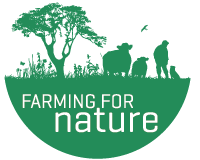Bryan & Gail Daniels
Bryan and Gail Daniels are both full-time conventional dairy farmers in Co. Kilkenny. They farm 157 hectares (388 ac) on varying soil types, at altitudes of 238-309m. They took on the farm at the time of quotas and found they couldn’t increase their income, so their focus became producing the cheapest litre of milk possible.
Since, they’ve been continuously ahead of the curve; using protected urea for 8 years, using Lower Emission Slurry Spreading since 2009 and using Selective Dry Cow Therapy since 2012. Their prerogative is to make their business resilient, Bryan says ‘we are trying to pre-empt anything that can be taken away from us'. Crucial to their operation is a careful breeding program where they don’t breed from cows who get lame, have a high cell count or a bad temperament and as a result, produce milk with a cell count of around 78.
They have reduced synthetic nitrogen use by over 50% from 220kg/ha in the last few years by incorporating clover. They’ve also put their foot down with their feed supplier, insisting on soya and palm-free feed from now on. They’ve weaned themselves off herbicides too, using just 1 litre for spot treatments.
The Daniels have a long family tradition of farming in harmony with nature being passed on from generation to generation. They are in ACRES and have put in low input grasslands using Timothy and Coxfoot, rather than Rye but ‘try to do what is right for nature, rather than chase a grant'.
He counts some of his hobbies as rebuilding stone walls and hedge-laying. They are continuously working on creating more habitats, particularly to provide accommodation for bats at the end of the farm without any outbuildings. They often see buzzards, sparrowhawks, kestrels and kites. There are solitary bees in clay banks and dragonflies in the river.
To further help aquatic species, they are undertaking covering the silage pit to prevent run off into the river. They are increasing the areas fenced out from the rivers and shelterbelts to provide space and protection for whatever wants to grow there. They are also underplanting Holly, Whitethorn, Scots Pine under an old Spruce shelterbelt, so they are well developed when the Spruce will be felled. In the last few years, they are leaving dead standing timber for insect habitats if it's not dangerous to the public to do so. In 2022, Bryan heard the first woodpecker. He has found its nesting site but hasn’t seen the bird yet.
NOMINATOR: Hannah Quinn Mulligan, Journalist
NOMINATION:
Bryan and Gail Daniels are a husband and wife team who are farming a 156ha farm in the south Kilkenny hills. With a stocking rate of 2.47LU/hectare and 272 cows, they run a conventional spring calving dairy system but they have a focus on animal welfare and soil welfare that sets them apart from other conventional farmers. They’ve spearheaded the use of clover to help replace artificial chemical fertilisers since 2003, long before it became popular or necessary for dairy farmers to do so. They’ve grown red and white clover, with a long term aim of minimising or eliminating the use of chemical fertiliser completely. Chemical sprays to control dock leaves have also not been used since 2003. Last year, almost one third of the farm was kept completely chemical nitrogen free.
They breed a traditional type of British Friesian cow, which Bryan believes is more resistant to bloat, which can impact cows grazing fields with heavy clover covers. He also feels these cows are hardy and well suited to the farm and breed better dairy and beef replacements. This type of cow almost always breeds a better beef animal than a Jersey or Jersey cross cow, which is important in the wider context of creating valuable beef animals from the dairy herd. In 2022, the cows had a yield of 5,422 litres of milk per cow and sold 4.35% fat and 3.71% protein with a somatic cell count of just 73. The concentrate fed to each cow was just 630kgs per cow which was well below the national average of around 1000kgs per cow.
The pair are both aware of the impact of imported feed and it’s relationship to deforestation, particularly in countries where soy is grown. They’ve pushed their dairy processor Tirlán, to produce a dairy nut that is 100% soy free for the farm and they’re keen to go even further and try to source all the grain for the nut from Irish farmers. Avoiding using imported grain and soy will help them to lower the carbon footprint of their farm.
Bryan is the fifth generation to run the farm and together with Gail, they also put a huge focus on the human sustainability of the farm. All farmers are at risk of burnout and work long hours. He installed a 44-point rotary parlour in 2016 to reduce the time spent milking and tries to ensure that all farm students and the farmers are finished in the yard by 5.30pm every day. Part-time labour is always used on weekends to ensure that family life with children can be prioritised.
Another element to the sustainability of the farm business is diversification and Gail has started a business making soap from the milk on the farm.
Across the 156ha farm, there is clear evidence of the healthy soil and a respect for nature, with wide bushy hedgerows and spaces left for nature and wild animals to thrive. They have plans to put in three ponds this summer and already have two owl boxes with plans for more around the milking parlour.
They’ve fenced off the old groves that Bryan’s grandfather planted and sowed native trees and bushes into them. They’ve been in environmental schemes since 1997 and do traditional hedge laying almost every year as well as setting aside eighteen acres for traditional hay meadows each year. These help to provide cover and feed for ground nesting birds.








